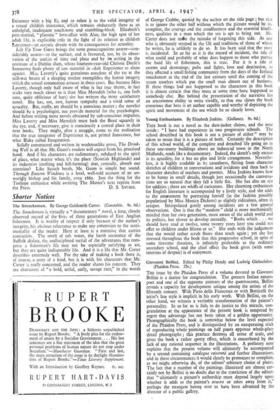Young Enthusiasts. By Elizabeth Jenkins. (Gollancz. 8s. 6d.) THIS book
is not a novel as the dust-jacket claims, and the note inside : "I have had experience in two progressive schools. The school described in this book is not a picture of either" may be taken to mean that it is a picture of both. Certainly the description of this school world, of the complete and detached life going on in these one-storey buildings above an industrial town in the North Midlands, reads like a documentary. Indeed, the sketch's only excuse is its actuality, for it has no plot and little arrangement. Neverthe- less, it is highly readable in its casualness, flitting from character sketches of children to conversations and incidents and then back to character sketches of teachers and parents. Miss Jenkins knows how to be funny in small' details, though just occasionally the conversa- tions are so natural that they fall a little flat. She has also an eye for oddities' there are whiffs of caricature. Her charming enthusiasm for English literature is accompanied by a lively style, and she adds to the amusement by portraying herself (in the fashion possibly popularised by Miss Monica Dickens) as slightly ridiculous, often in scrapes. Interpolated gently among incidents are a few general observations. One is that the " modem " child is more mechanically minded than her own generation, more aware of the adult world and its politics, but slower to develop mentally. "Books which . . . we should have read at twelve, some twenty years later you could not offer to children under fifteen or so." She ends with the judgement that she would rather scrub floors than teach again ; yet she has stressed throughout the book that this progressive school, in spite of some tiresome theorists is infinitely preferable to the ordinary secondary schoolz and the chief effect the book gives (with some interims of despair) is of enjoyment.


































 Previous page
Previous page